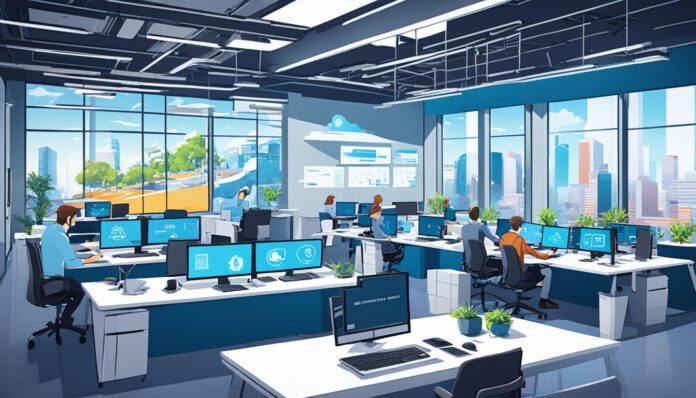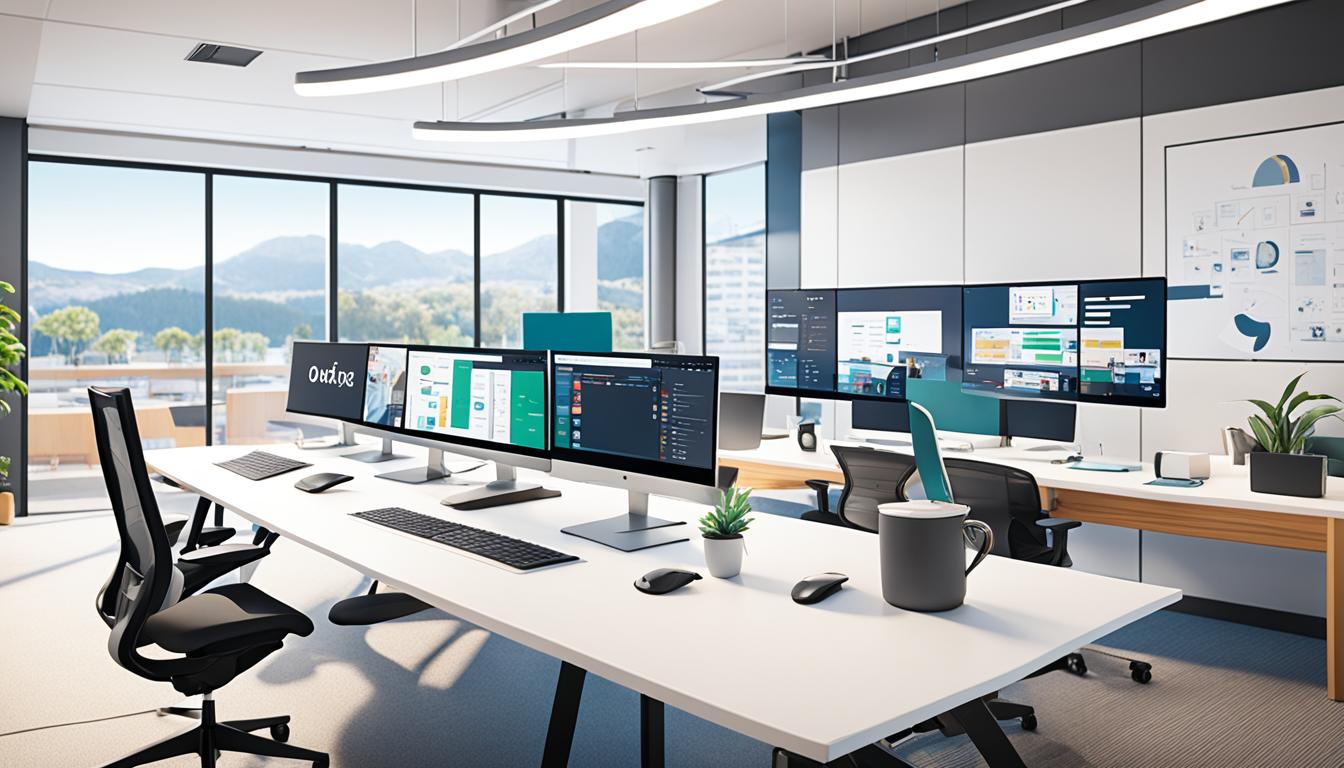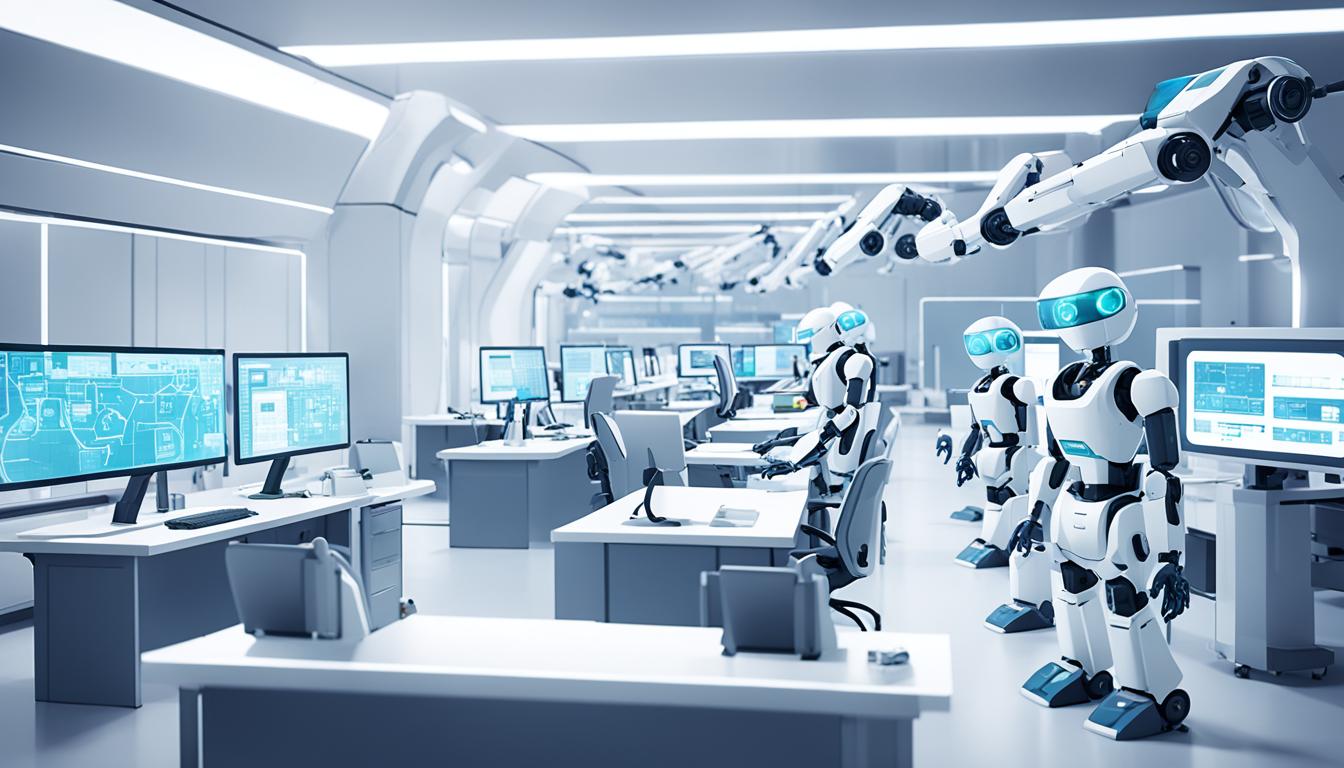
“The future depends on what you do today.” – Mahatma Gandhi
In the lead up to 2025, work will look very different. This change is powered by digital growth and new workplace habits. COVID-19 has pushed us to shift faster. Now, companies like General Motors Co. are making more flexible work schedules. Their HR leader, Adam Yeloushan, points out that working from home has proven successful. Bhushan Sethi from PwC adds that, soon, offices will change. They won’t just be places to work. They’ll be hotspots for new ideas and meeting people.
Most leaders, about 82%, are thinking of offering remote work. This info comes from Gartner Inc. And companies are more open to hiring people who work from home. The trend towards flexible and digital work is clear. Companies are also putting a lot more effort into keeping workplaces safe. McKinsey & Co. says this will lead to more jobs in these safety-focused areas.
Key Takeaways
- The future of work is gearing towards increased reliance on remote work and digital transformation by 2025.
- Organizations like General Motors Co. are leading the way in embracing flexible work schedules.
- Offices are expected to transform into innovation and social hubs, as noted by Bhushan Sethi from PwC.
- The pandemic has accelerated trends in health and safety, diversity, and technological integration.
- Executives are showing strong support for remote work options, as evidenced by Gartner Inc. and The Conference Board surveys.
- Investment in health and safety protocols is becoming a major trend, with increased hiring in these sectors.
The Rise of Remote Work
The pandemic has pushed the trend of working from home forward. It’s now a major way people work. This big change has brought good and bad things for businesses. They are learning how to make the most of it.
The Shift to Remote Work: A Pandemic Legacy
During COVID-19, working from home became a must. This big change is here to stay, making work more flexible. Companies are realizing that working remotely has benefits, such as being able to hire from anywhere and saving money.

Advantages of Remote Work for Employers
Remote work is great for companies. They can save on office space and find the best people worldwide. This makes things run smoother, saves money, and makes employees happier.
These pluses include:
- Wider talent acquisition
- Lower operational costs
- Increased employee satisfaction
Challenges and Solutions for Remote Workers
But, working from home can be tough for employees. Keeping morale up and working well can be hard. Companies are finding ways to help, from more virtual meetings to better tools for working remotely.
General Motors and others are finding ways to make it work. They do regular check-ins and keep in touch well. They also work on keeping employees involved.
The Hybrid Work Model
After the pandemic, companies are looking for ways to work that suit everyone. They found the hybrid model works best. It combines being in the office sometimes with working from home. This helps people have a better work-life balance without losing the office culture.

Balancing Office and Remote Work
The hybrid work style changes how offices look and work. Now, we need spaces that let us work alone or together easily, thanks to experts like Jamie Feuerborn. Adding things like hot desking helps make the most out of office spaces. This way, people can enjoy home’s comfort while still sharing ideas at the office.
Cultural Shifts in a Hybrid Work Environment
Mixing work at home and the office also changes a company’s culture. Leaders, like Scott Lesnick, say being quick to change helps keep everyone happy and connected. With work-life balance in mind, it’s important for companies to be flexible. This makes work enjoyable and rewarding for their teams.
Here are ways companies can adjust for a hybrid work style:
- Dynamic Office Spaces: Areas that change to fit what’s needed each day.
- Innovative Workstations: Using shared desks and spaces to save money and work better.
- Flexible Policies: Letting people work where they can do best, whether at home or in the office.
Workplace Automation and AI
Automation and AI are changing how we work, making some people nervous and others hopeful. The quick growth of AI is altering what jobs need from people and opening up new ones.

The Impact of AI on Employment
AI taking on more tasks is affecting jobs in big ways. Some jobs might go away, pushing workers to learn new things. But, this shift also means new chances are opening up, like jobs that focus on running AI systems.
Technology-Enhanced Productivity
Although some worry about losing jobs, AI can actually make us more productive. It takes over the boring, repeat tasks, so we can do more meaningful work. This makes companies more efficient and lets people focus on creativity and strategy.
Emphasis on Employee Experience
The importance of employee experience is key in keeping and attracting talent. This is especially true for Millennials and Gen Z. They want a workplace that values diversity and well-being. McKinsey & Co. says better programs for diversity, equity, and inclusion are a must. They make workspaces more inviting for everyone.
Because of this, companies are including engagement strategies and mental health support in their plans. PwC notes that these ways of helping workers are crucial. They keep employees invested and hardworking. So, keeping staff happy and healthy is a big part of keeping them aboard.
Here are some key points on how to boost employee happiness and their payoffs:
| Key Elements | Benefits |
|---|---|
| Diversity and Inclusion Programs | Enhanced Creativity, Better Problem-Solving, Increased Retention |
| Mental Health Benefits | Higher Productivity, Lower Absenteeism, Improved Morale |
| Flexible Work Arrangements | Improved Work-Life Balance, Higher Job Satisfaction, Stronger Engagement |
Lastly, setting up a strong employee experience plan, paired with good engagement strategies and ways to keep staff, prepares companies for what their team wants.
Conclusion
The workplace is changing fast, and by 2025, it will look very different. We’re going to see more people working from home. New technology like AI will also play a big part. These changes will make jobs more efficient but will also create new roles.
Companies will need to keep up with these changes to stay competitive. They also have to make sure their employees are happy and supported. A workplace that’s diverse, fair, and focused on well-being will have stronger, more motivated teams. This is all to prepare for what the future of work has in store.
FAQ
How has the COVID-19 pandemic influenced workplace flexibility?
The COVID-19 pandemic made flexible work schedules normal. Companies like General Motors saw how well it worked during the pandemic.
What are the anticipated benefits of remote work for employers?
Employers see that remote work means they can hire from anywhere. It saves money and keeps work going, as Facebook has shown.
What challenges do remote workers face, and how are they being addressed?
Remote workers find it hard to stay efficient and connected. General Motors and Facebook are working on better technology and practices to help.
How is the hybrid work model shaping the future of work?
The hybrid model blends working in an office with work from home. It allows for a mix that fits people’s work needs and personal space choices.
How is workplace culture adapting in a hybrid work environment?
In a hybrid setting, workplace culture focuses on being flexible and creative. Experts like Scott Lesnick and Jamie Feuerborn talk about how to make collaboration innovative.
What impact is automation and AI having on employment?
Automation and AI change how jobs work and create new jobs. But, they can also mean some people might lose their jobs. Companies should use AI wisely to make work better and more efficient.
How can technology enhance productivity in the workplace?
Technology, especially AI, makes work smoother, more efficient, and offers new opportunities. It can really increase how much work gets done.
Why is employee experience now more important than ever?
Having a great experience at work is key to keeping the best people. This is especially true for young workers. Companies are focusing on things like fairness, health, and inclusivity to keep their teams happy and engaged.
What strategies are companies using to improve employee retention and engagement?
To keep employees happy and working well, companies are doing a lot. They’re offering help with mental health, more flexible work, and making sure everyone feels like they belong.
